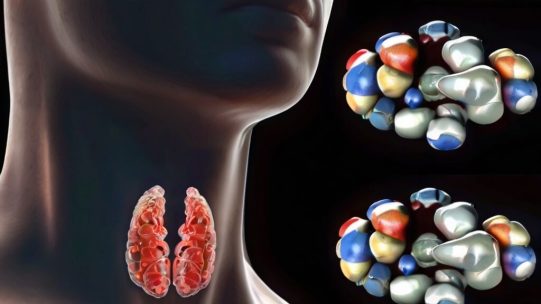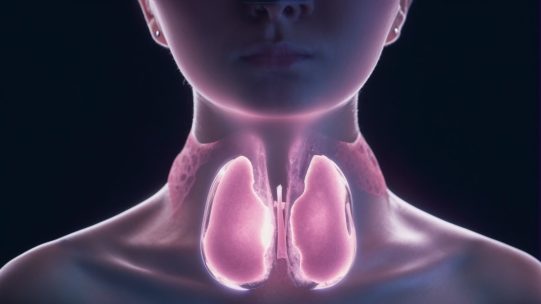What happens when the thyroid gland is working too hard or not hard enough?

January is Thyroid Awareness Month and a good time to learn how important it is for the thyroid gland to function properly.
The thyroid gland is a butterfly-shaped gland located at the base of the neck. It produces hormones that regulate heart rate, blood pressure, body temperature, and weight. If the thyroid gland is not functioning properly, whether it is too active or not functioning adequately, all of these functions are affected.
Hyperthyroidism
Hyperthyroidism (an overactive thyroid gland) occurs when the thyroid gland produces too much of the hormone thyroxine.
Hyperthyroidism can mimic other health problems and can be difficult for the medical team to diagnose. Hyperthyroidism accelerates the body’s metabolism and can cause a variety of signs and symptoms.
Symptoms of hyperthyroidism can include:
- Unintended weight loss
- Fast or irregular heartbeat
- A pounding sensation in the heart called palpitations
- Increased hunger
- Nervousness, anxiety, or irritability
- Tremor, usually a small tremor of the hands or fingers
- Sweating
- Changes in menstrual cycle
- Increased sensitivity to heat
- Changes in defecation patterns, especially increased frequency of defecation
- Increased goiter
- Increased tiredness
- decreased muscle strength
- Sleep disturbances
- Warm, moist skin
- Thin skin
- Thin, brittle hair
Hypothyroidism
In hypothyroidism, the thyroid gland does not produce enough of the important hormones.
Hypothyroidism affects all aspects of metabolism, affecting the control of important functions such as body temperature and heart rate.
Hypothyroidism may cause no noticeable symptoms in its early stages. Or one might think that it is simply a result of getting older. However, as the metabolism continues to decline, more obvious problems may develop.
Symptoms of hypothyroidism can include:
- Fatigue
- sensitivity to cold
- Constipation
- Dry skin
- Weight gain
- Facial swelling
- Hoarseness
- Muscle weakness
- Increased blood cholesterol level
- Muscle pain, tenderness, stiffness
- Joint pain, stiffness, or swelling
- Heavy or irregular menstrual flow
- thinning hair
- Decreased heart rate
- Depression
- Decreased memory
- Enlarged thyroid gland (goiter)
If hypothyroidism goes untreated over time, it can lead to many health problems, including obesity, joint pain, heart disease, and peripheral neuropathy.
Standard treatment for hypothyroidism involves the daily use of levothyroxine, a synthetic thyroid hormone. This oral medication restores proper hormone levels and reverses the signs and symptoms of hypothyroidism.
You will feel better as soon as you begin treatment. This medication may gradually lower cholesterol levels elevated by the disease and may reverse weight gain. Treatment with levothyroxine will probably last a lifetime, but your medical team will probably check your thyroid-stimulating hormone (TSH) levels annually, as the amount needed may change.









